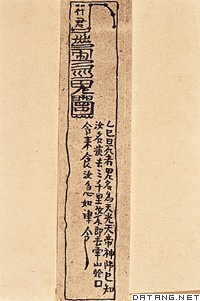1) west Han


神仙方术
2) View of Fairy and Divination


神仙方术观
1.
On the Stages and Characters of Cao zhi s View of Fairy and Divination;


论曹植神仙方术观的分期与特征
3) the culture of supernatural being and alchemist


神仙方士文化
1.
But the scholars usually pay much attention to the relationship between Taoist and Taoism in the study and almost no one study Taoism from the angle of the culture of supernatural being and alchemist The thesis examines the evolution of the culture of supernatural being and alchemist itself and attempts to trace the emergence of Taoism .
秦汉神仙方士文化是孕育早期道教产生的重要文化要素。
4) immortals
[英][i'mɔ:tl] [美][ɪ'mɔrtḷ]


神仙
1.
"Socialization" and "Secularization" of Taoist Immortals in the Popular Stories during the Ming and Qing Dynasties
明清小说中神仙形象的“社会化”与道教的“世俗化”
2.
The stories of immortals recorded in Tai Ping Guang Ji took place mostly during the Han(202BC-220) and Tang(618-907) periods,and chiefly in the middle and lower reaches of the Huanghe River,an area where most of the ancient emperors ruled.
《太平广记》神仙故事中神仙活动的时代主要分布在唐代和汉代,地域主要集中于帝王活动密集的黄河中下游地区,这种时空分布特点与现实中帝王对神仙思想或道教的有意倡导有着密切的关系。
3.
Relationship between immortals and mortals in the novels during Han Wei and Six dynasties underwent a gradually transforming process.
神仙与凡人的关系在汉魏六朝志怪小说中经历了一个逐渐转变的过程。
5) immortal
[英][ɪ'mɔ:tl] [美][ɪ'mɔrtḷ]


神仙
1.
Sima-xiangru s thought has some Taoism and immortal element;


司马相如的道家与神仙思想
2.
From the time of Wei-Jin dynasty, due to the attack and use of contemporary ruling class, the early-staged Taoism of Han dynasty began to be polarized into immortal Taoism believed by the upper classes and the civil Taoism accepted by the folk people.
从魏晋时起,道教由于受当时统治阶级的打击和利用,由汉末的早期道教开始分化为上层神仙道教和下层的民间道教。
3.
The Taoist belief of immortals is closely related with the Chinese folk beliefs.


道教神仙思想与中国民间信仰有着天然的紧密联系。
6) Celestial
[英][sə'lestiəl] [美][sə'lɛstʃəl]


神仙
1.
The Theroist of religious Daoism demonstrated "the long life and celestial"and expounded the ways and methods of acquiring Tao and becoming the celestial ,which layed a foundation about the theory of "the long life and celestial".
道教理论家对神仙即长生不死的人的系统论证以及对得道成仙的途径和方法的阐扬,使道教的长生成仙说获得了一定的理论依据。
补充资料:方术
| 方术 中国古代用自然的变异现象和阴阳五行之说来推测、解释人和国家的吉凶祸福、气数命运的医卜星相、遁甲、堪舆和神仙之术等的总称。方术起源于原始社会的巫术。人们相信天主宰着一切人事,人间的统治者受命于天,把自然界的日月星辰、风云雨雪、山川草木、鸟兽虫鱼等的变异,视为灾异和祥瑞的征兆。殷、周之际出现的阴阳五行思想,到战国时广泛流行。一切医卜星相都以阴阳五行为原则而推演。有自诩能把灵魂从躯体中解脱出去,能接近鬼神的;有宣称渤海中有3神山:蓬莱、方丈和瀛洲,山上的宫阙都是用黄金和白银筑成,住着长生的神仙,藏着不死的奇药的。齐威王、齐宣王和燕昭王乃至以后的秦始皇、汉武帝都听信这些无稽之谈。
汉武帝时齐人上疏言神怪奇方的竟达万余人。他们或入海寻求蓬莱,或候祠神仙,以博取利禄富贵,但均无效验 ,骗局时被揭穿。汉武帝以后,一部分方士和儒生合流,制作图谶,用阴阳五行来解释儒家的经传。另一部分方士则吸取黄、老和浮屠之说,宣扬符命灾异、吉凶占应、祈福禳灾 、轮回报应等,成为道教的先行者。用自然的变异来推测人事的吉凶祸福是没有根据的,除去它附会的迷信观念外,其观察、记录和用阴阳五行来说明自然的变异,却在一定程度上反映了自然现象及其变化规律。有的方士从事炼丹和神仙之术,也积累了不少化学和医药的知识。中国古代的天文、历数、医药、化学有一部分是和方术交织在一起,并且是从方术内部发展起来的。 |
说明:补充资料仅用于学习参考,请勿用于其它任何用途。
参考词条
